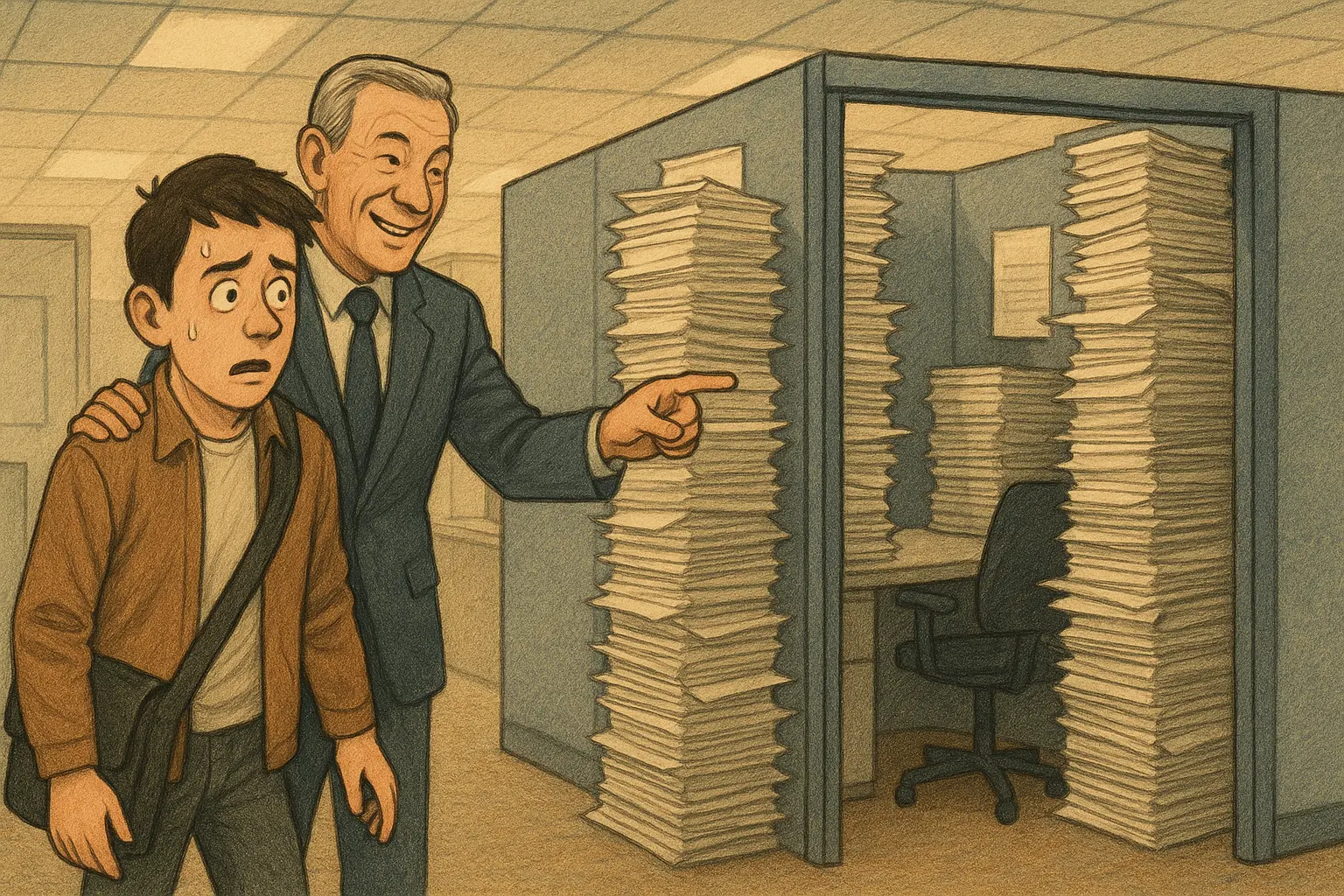Your First Planning Job
Your first planning job can (and probably will) feel like stepping into a completely different world from what you studied in school. In planning studio, you were designing vibrant neighborhoods, dreaming up walkable communities, and mastering land use theory. But as an entry-level planner in a city (or county) planning office, you're quickly faced with zoning codes, permit reviews, and unexpected public comments at late-night meetings.
So, you finally landed your first planning job.
Congrats!
You’re an official entry-level planner now, which means instead of designing utopias in studio critiques, you're explaining setback requirements to confused homeowners and wondering why every public meeting feels like open mic night at chaos karaoke. Welcome to your new planning office, where your best accessory is a calm voice and a really good coffee mug. (shameless plug, but you should check out our mugs here).
Planning school gave you the tools to think big: comprehensive plans, equity frameworks, maybe even a killer ArcGIS map or two. But what no one quite prepared you for was the day-to-day of professional planning. The part where your job feels more like detective work, code interpretation, and sometimes therapist for angry neighbors.
Don’t worry, it’s not just you.
There’s a whole world of things they don’t cover in the syllabus… and we’re about to get into them.
Expectation vs. Reality
Your expectation: You’ll spend your days sketching beautiful cityscapes, proposing bike-friendly boulevards, and quoting Jane Jacobs in meetings where everyone nods in agreement.
Your reality: You’re knee-deep in site plan submittals, trying to decode someone’s backyard patio permit from 1994 while being told that allowing a duplex will “bring back the raccoons.”
In school, you learn to think in systems: land use, transportation, housing, environment. In the job, you learn to think in acronyms: CUP, TDR, FLU, LDC (and yes, you’ll be pretending you know them all until you actually do).
Studio taught you to dream. Your first job teaches you to navigate. And that’s not a bad thing, it’s just a different skill set.
What They Don’t Tell You
1. You won’t always be “planning.”
Sometimes you’re an interpreter, sometimes a code detective, and sometimes a referee in a heated fence-line dispute. Those dreamy comp plans? You'll reference them… right after you explain for the fourth time that someone can’t have a taco truck in a residential zone.
2. Your writing matters. A lot.
You will write...a lot. Those policy memos, staff reports, and meeting summaries? They're your bread and butter. Clear, well-organized writing makes you look 10x more competent and keeps you from getting misquoted at the next public meeting.
3. Public meetings are a whole thing.
You’ll hear everything from genuine neighborhood concerns to wild theories involving property values and secret tunnels (this is not even exagerating). Learning to stay calm, respectful, and occasionally diplomatic when someone calls you a “government spy" is part of the job.
4. Office politics aren’t just for TV.
You might assume planners are all on the same page, but departments have their own goals, communication styles, and... personal histories. Building trust and learning the unwritten rules is just as important as knowing the zoning code.
5. You’ll say “no” more than you say “yes.”
“No, your front yard can’t be 100% concrete.” “No, you can’t build a 7-Eleven in a historic district.” "No, you can’t declare your tool shed an ADU and start renting it on Airbnb." Being the bearer of bad news isn’t fun but it’s part of the role. The key is learning how to say “no” in a way that feels fair and informative.
What Helps You Thrive
1. Emotional resilience.
Some days will feel like you’re doing meaningful work. Other days you’ll wonder if you got a master’s degree to explain fence height limits. Stay grounded. It gets easier, and yes, your work matters even when it feels small.
2. Know your code.
It’s not glamorous but it’s one of the most powerful tools you'll have. Knowing your zoning code inside and out gives you confidence, saves time, and makes you the go-to person in the office (and on the phone with a very persistent developer).
3. Build relationships.
Get to know the folks in Public Works, Building, Legal, GIS, and even that one person in Records who can find an obscure easement map from 1978. Planning is collaborative and those relationships are gold.
4. Keep your mission in view.
It’s easy to get lost in the bureaucracy, but remember why you got into planning in the first place. Whether it’s housing, sustainability, equity, or just making your city a little better let that be your compass.
5. Rest
You can’t plan thriving communities if you’re running on fumes and caffeine. Close the laptop. Take a walk. Watch that zoning board livestream tomorrow. Rest isn’t laziness, rather it’s how you prevent becoming the person who snaps at a resident over a setback variance.
Final Thoughts
Your first urban planning job won’t be exactly what you imagined and that’s okay. The transition from studio to city hall is full of surprises, awkward learning curves, and moments where you silently question all your life choices during a 3-hour variance meeting.
But it’s also where you grow. You’ll sharpen your judgment, develop your voice, and start to see how the pieces of a city fit together in policy, politics, and people.
So take a breath, take notes, and take pride in the work you’re doing. Because no matter how many backyard shed disputes you mediate, you’re part of shaping places where people live, work, and connect. And that’s pretty amazing.
%20(1200%20x%20237%20px)%20(300%20x%2059%20px).webp)
